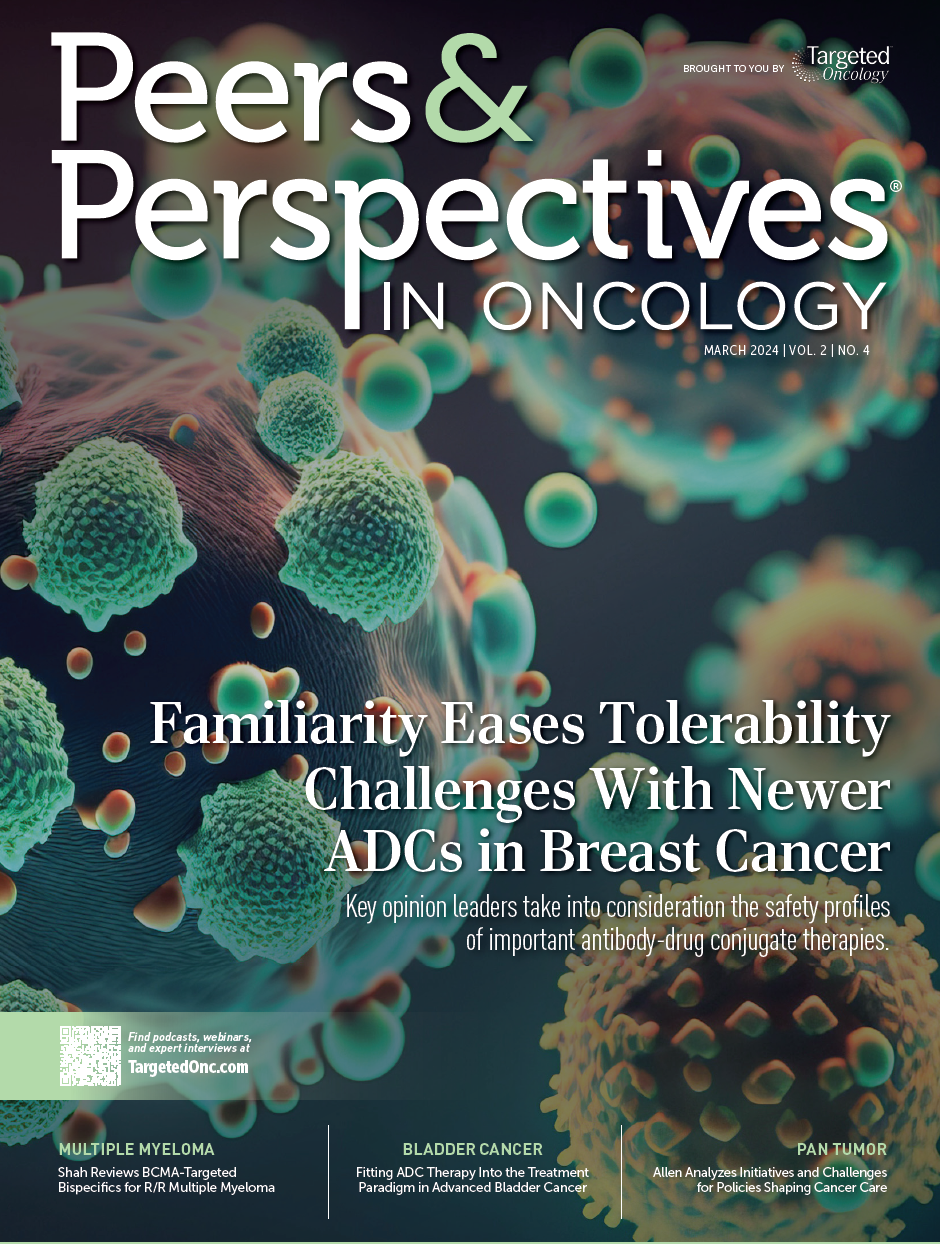Ghamande Reviews Latest Chemoimmunotherapy Trials for Endometrial Cancer
During a Targeted Oncology™ Case-Based Roundtable™ event, Sharad A. Ghamande, MD, discussed the significance of the NRG-GY018/KEYNOTE-868 and RUBY trials of immune checkpoint inhibitor plus chemotherapy in patients with advanced endometrial cancer.
Sharad A. Ghamande, MD
Professor, Executive Vice Chair, and Director, Gynecologic Oncology
Augusta University Medical College of Georgia
Augusta, GA

CASE SUMMARY
August 2021
- A 64-year-old postmenopausal woman presented with abnormal uterine bleeding lasting 4 months.
- She noted that she underwent menopause aged 55 years.
- She is a widow, has no children, and lives alone.
- Medical history: arthritis, obesity (body mass index of 40), hypertension well controlled with medication
- ECOG performance status: 1
- Endometrial biopsy: stage IA, grade 1 endometrial cancer
- The patient was counseled on surgical options then scheduled for total laparoscopic hysterectomy with bilateral salpingo-oophorectomy and sentinel lymph node dissection.
- Immunohistochemistry/molecular testing results: mismatch repair deficient (dMMR)
- Microsatellite instability (MSI) high
- Estrogen receptor positive (score of 3+)
- The patient was counseled on surveillance every 6 months for a year and then annually thereafter.
August 2022
- She reported intermittent pelvic pain over prior 4 weeks.
- Chest, abdomen, and pelvis CT scan suggested relapsed/ metastatic disease with involvement of 1 right external iliac lymph node.
- Carboplatin/paclitaxel (6 times every 4 weeks) was administered, chemotherapy was well tolerated, and a complete response was recorded at end of regimen.
April 2023
- Disease relapse was documented on routine follow-up.
- Chest, abdomen, and pelvis CT scan showed heterogeneously enhancing mass in right suprarenal space, multiple bilateral pulmonary nodules, and a new right internal iliac lymph node (in addition to the previously observed cancer-positive lymph node).
- Fine-needle aspiration of the suprarenal mass confirmed metastatic endometrioid adenocarcinoma.
What new data were published for the combination of chemotherapy and pembrolizumab (Keytruda) in patients with advanced or recurrent endometrial cancer?
GHAMANDE: This…was the big news at the Society of Gynecologic Oncology and American Society of Clinical Oncology [annual meetings in 2023], so I’m going to talk a little bit about it. This was NRG-GY018 or KEYNOTE-868 [NCT03914612].
These were patients who were chemotherapy naive with advanced endometrial cancer or patients who have recurrent endometrial cancer but are chemotherapy naive. They all had stage III/stage IV or had recurrent disease, and they [included patients who were] MMR proficient [pMMR] or dMMR.
They were randomly assigned to paclitaxel/ carboplatin at standard dosing at 175 mg/m2 at area under the curve [AUC] 5 mg/mL/min, with or without pembrolizumab, which was placebo controlled. They got maintenance pembrolizumab for an additional 12 months. [A total of] 590 of those patients were [pMMR], and 185 were [dMMR], which reflects what happens in the real world, and that was a stratification factor.1 In terms of baseline characteristics, what I’m going to focus on is…if you look at dMMR vs pMMR, the percentage of African American patients who were pMMR was significantly higher, 15% to 17%, compared with [8% to 9%] who were dMMR. The percentage of serous cancers, which is classic type 2 endometrial, is 25% [in the pMMR cohort], which is high. I think everything else is pretty similar [between the arms].
What were the efficacy outcomes of this study?
The results are pretty impressive. If you’re looking at frontline [treatment], if you add pembrolizumab to chemotherapy, you have a significant improvement in progression-free survival [PFS]. If you look at the dMMR cohort, the HR is 0.3, which is a 70% reduction in your disease coming back [95% CI, 0.19-0.48]. If you look at the pMMR cohort, where typically immunotherapy doesn’t work as well, the HR here is 0.54, which is a 46% improvement in PFS [95% CI, 0.41-0.71].
The median PFS is not reached on the dMMR cohort [95% CI, 30.6 months to not reached, vs 7.6 months’ median PFS with paclitaxel/carboplatin (95% CI, 6.4-9.9)]. For the pMMR cohort, median PFS is approximately 13 months [95% CI, 10.5-18.8] for paclitaxel/carboplatin with pembrolizumab vs 8.7 months [95% CI, 8.4-10.7] for the chemotherapy alone with placebo, which obviously are all statistically significant. These are practice-defining [data] in the sense of adding immunotherapy to chemotherapy, [which] is the new standard of care and makes a [major] difference in our patients, especially in the dMMR cohort.
[Most oncologists] have used immunotherapies frequently now, so we know the immunotherapy-related adverse events [AEs]. I would look at some of the [reported AEs] here, which are the infusion-related reactions; hypothyroidism and hyperthyroidism; colitis, which is obviously [associated with] immunotherapy; and the rare AEs like interstitial lung disease, hepatic failure, and pancreatitis. But [most of us] know the incidence and how it is all managed.
How was dostarlimab (Jemperli) investigated in the phase 3 RUBY trial (NCT03981796), and how does this compare with the trial of pembrolizumab?
[RUBY] is the other trial [of immunotherapy plus chemotherapy]. Both these trials, RUBY and NRG-GY018/ KEYNOTE-868, were absolutely the biggest news in gynecologic cancers. RUBY had the same design; a 1:1 randomization of 470 patients with recurrent or primary advanced endometrial cancer, stratified by MSI status, [prior pelvic radiotherapy, and disease status]. Dostarlimab was given at 500 mg with paclitaxel at 175 mg/m2 and carboplatin AUC 5 mg/mL/min every 3 weeks for 6 cycles.
The trial was placebo controlled and double blinded. One of the big differences in these trials was that [after the first 6 cycles] the dosing of dostarlimab was every 6 weeks for up to 3 years. In the KEYNOTE-868 trial, they did 14 cycles. This was up to 3 years unless they progressed, with the follow-up subsequent to that.2
There were no significant differentiators between patients in the overall population, which is not dMMR. Unlike like the previous trial where [it was split into] dMMR and pMMR status, their split-up was dMMR vs the intent-to-treat overall population. The overall population had a greater incidence of African Americans and patients with serous and clear-cell adenocarcinoma. The one thing which is important, which is very differentiating for RUBY vs KEYNOTE-868, is the fact that they allowed patients who had carcinosarcomas. One of my pet peeves as a gynecologic oncologist is there are not many trials out there for malignant mixed Müllerian tumors or carcinosarcomas, which are pretty aggressive. They allowed a finite number of patients, and then they closed that cohort to primarily focus on endometrial cancers.
They [presented results] differently from KEYNOTE-868. They looked at the overall population, all-comers, and the HR is 0.64, which is a 36% reduction in a recurrence of disease [95% CI, 0.51-0.80; P < .001]. At 24 months, 36% [had not progressed] with dostarlimab vs 18% on the placebo, and at 12 months it was approximately 50% vs 30%, respectively.
Looking at the data split by the dMMR and pMMR, for those with MSI-high or dMMR disease, the HR is stunning. It’s 0.28 [95% CI, 0.16-0.50; P < .001], so that’s a 72% reduction in disease coming back. The [Kaplan-Meier] curves are far apart, and they keep on going. At 2 years, you’re looking at [61.4%] still on dostarlimab vs 15% in the placebo group. In the pMMR or MSI-stable arm, you still had activity with an HR of 0.76 [95% CI, 0.59-0.98], which is a 34% reduction. At the 2-year mark, you’re looking at 28% vs 18% who still had no recurrent disease.
REFERENCES:
1. Eskander RN, Sill MW, Beffa L, et al. Pembrolizumab plus chemotherapy in advanced endometrial cancer. N Engl J Med. 2023;388(23):2159-2170. doi:10.1056/NEJMoa2302312
2. Mirza MR, Chase DM, Slomovitz BM, et al; RUBY Investigators. Dostarlimab for primary advanced or recurrent endometrial cancer. N Engl J Med. 2023;388(23):2145-2158. doi:10.1056/NEJMoa2216334

Roundtable Roundup: Treatment for Metastatic pMMR Endometrial Cancer
July 23rd 2024In separate, live virtual events, Michael J. Birrer, MD, PhD, and Jubilee Brown, MD, surveyed participants on the treatment of a postmenopausal woman with stage IVA endometrial cancer after first-line chemotherapy.
Read More
Depth of Response With Quadruplet Regimens Considered in Newly Diagnosed Multiple Myeloma
July 18th 2024During a Case-Based Roundtable® event, Timothy Schmidt, MD, and participants discussed treatment selection for a 54-year-old patient with transplant eligible R-ISS stage 2/R2-ISS stage 3 IgG-κ myeloma.
Read More
Rossetti Reviews Myelofibrosis Risk Stratification and Outcome Data for Pacritinib
July 17th 2024During a Case-Based Roundtable® event, James M. Rossetti, DO, discussed the role of risk scoring and stratification tools and treatment for a patient with declining hemoglobin and platelet counts due to primary myelofibrosis.
Read More